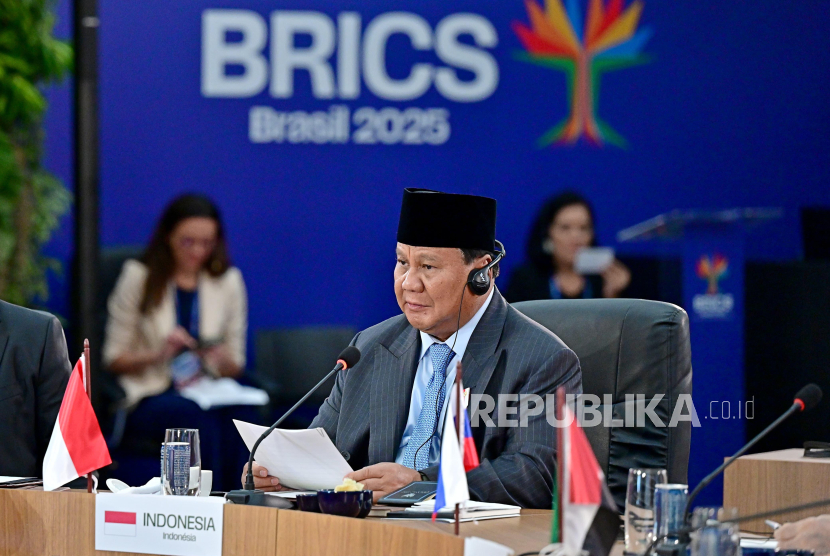
Oleh : Iskandarsyah Siregar, Head of Center for National Resilience Studies
REPUBLIKA.CO.ID, JAKARTA -- The world is currently facing a new dynamic that is increasingly uncertain. The architecture of the post-World War II global order, formed by the West with the United States as its sole pillar, is now starting to crack, giving way to a multipolar constellation full of intrigue and shifting alliances. Indonesia, as the largest sovereign country in Southeast Asia and the largest economy in the ASEAN region, can no longer play it safe on the edge of the stage. The gimmicks of being a good and sweet kid are no longer relevant for Indonesia to play. This nation must dare to step into the middle of the arena, shedding doubts and domestic political vulnerabilities.
Indonesia's position today is shaped by its courage to confront and address contemporary geopolitical challenges, which are fraught with pressure, especially from global powers such as China, the United States, Russia, and emerging alliances like BRICS. One of the most recent and controversial issues is President Donald Trump's harsh response to the joint statement of the BRICS countries at the Summit in Brazil, which touched on the trade war and unilateral US actions against Iran. Trump, in his typical style, again issued threats of additional tariffs — a signal that economic and psychological dominance are still his primary weapons. But what does all this mean for Indonesia?
BRICS, Trump's Threats, and Indonesia's Position
At the recent BRICS Summit in Brazil, the joint statement of the BRICS member countries subtly but criticised Trump's aggressive foreign policy, particularly the tariff war and military action against Iran. In response, Trump again demonstrated his 'ultimate move': the threat of additional tariffs against several countries. This is not the first time the world has witnessed a leader's style that prioritises pressure over dialogue. However, when diplomacy is met with economic intimidation, the global stage is no longer about moral leadership, but rather a form of coercive domination.
For Indonesia, this situation has the potential to create a dilemma. In fact, Trump has decided to impose a 32% import tariff on Indonesia. Whatever the normative reasons given for this, in fact, Indonesia's siding with America's "enemies" is the most rational and factual reason for this situation. Joining BRICS — or simply showing political support for the multipolar discourse — risks triggering pressure from Washington. However, being passive undermines Indonesia's strategic interests, which require independence in making foreign policy decisions. This is what is known as the moment of truth, where Indonesia's diplomatic courage is put to the test. This situation represents a discourse that is not only about who is supported, but also about how strong Indonesia is in surviving under pressure from great powers.
Political Anthropology of a Threatener
We can read the direction of Donald Trump's policies from the perspective of psycholinguistics and political semiotics to obtain a comprehensive and engaging picture. The figure of the American president is not just a populist leader; Trump is a product of a culture of political narcissism that prioritises threats as the primary method of communication. In every international interaction, Trump often builds a narrative that positions the US as both a victim and a hero. This is a technique that unconsciously demands that the world conclude "submit or be eliminated."
In his speeches, threats become a repetitive style. Words such as "we will retaliate," "massive tariffs," or "they will pay the price" are part of the discursive pattern used by Trump to dominate psychologically. This is an attempt to subdue not with bullets, but with symbolic and mental pressure. But we must realise that Trump does not always win. History shows that Trump's threats are not always effective. When he threatened Iran with a massive attack in response to Iran's retaliatory attack on Israel, the world was preparing to witness a new round of World War III. But what happened next? Trump slowly backed down, replacing rhetoric with de-escalation. Iran did not flinch. Iran fought back with confidence, and the world saw that Trump's rhetoric can be countered if responded to with consistency and courage.
Lessons for Indonesia: Consistency Is Ammunition
Indonesia needs to learn two lessons: first, not to be afraid of threats voiced by parties that don't care about the Indonesian nation and state. Second, remain consistent in every strategic decision. If Indonesia chooses to move closer to BRICS or at least build an alternative axis to Western domination, then its choice must be firm and consistent over the long term. It cannot have one foot in Washington and one in Beijing or Moscow. An independent and active foreign policy does not mean freedom from commitment or historical responsibility. Instead, this type of policy emphasises sovereignty and steadfastness in achieving the nation's and state's vision and mission.
Indonesia's entry into the BRICS orbit presents strategic opportunities, including access to non-dollar global funding, the establishment of alternative financial systems (such as BRICS Pay/currency), and the strengthening of the Global South axis. But Indonesia must also be prepared for the consequences: diplomatic pressure, technology embargoes, or a war of opinion in the global media, likely driven by Washington's lobbying power. In fact, there are strong indications that American "agents" and their allies with Indonesian ID cards will begin to develop anti-BRICS narratives.
Consequences are not to be avoided, but managed. This is precisely where Indonesia's strategic value is determined: how well we read reality, strategise, and construct alternative narratives.
War for Peace: A Paradox That Must Be Accepted
We must realise and accept that the ugly truth, "Indonesia must be ready to fight to achieve true peace," is not a mere rhetorical metaphor. It is a reality and an inevitability in the history of civilisation. The world has never been stable without a respected power. In the modern context, war is not always military, but can be economic, information, technological, and even linguistic.
Indonesia must always be vigilant and prepared for all forms of warfare. Amid the threat of disruptive social and digital dynamics, global opinion battles, and trade wars, national strength is not merely about military or natural resources, but about unity in vision and the execution of national policies.
Information warfare, for instance, has transformed social media into a proxy battlefield. Hoaxes and propaganda will swallow up those who fail to control the narrative. Indonesia must no longer allow its narrative to be controlled by foreign media, external research institutions, or global liberal thinkers who lack an understanding of the domestic context. Indonesia must begin to mobilise its forces to strengthen this sector. However, the threat of physical war is neither an illusion nor a fiction. It is not impossible that one day technology and all digital resources will become extinct, or "extinct" because they no longer benefit their "owners." At that point, a natural-style battle will begin.
Building National Resilience as a Pillar of Global Victory
The most significant potential for damage to a country is not external defeat, but internal fragility. Indonesia's national resilience must be built in an integrative manner. Political, economic, cultural, technological, and ideological resilience are variables that must be consistently and massively addressed in strengthening national resilience. In each of these components, the people must be positioned as the primary actors, not mere objects.
The Indonesian government must stop treating the people as "masses to be guided." Instead, they must be approached as strategic partners in development and resilience. The education system must be structured to produce citizens who are qualified and competent in geopolitical thinking. The media must be empowered to serve as guardians of the national narrative, not accomplices to external propaganda. All national resources must be directed towards being creative and active in responding to the dynamics of the new world civilisation that is unfolding today. If the government fails to build trust and public participation, then when global pressure comes, Indonesia will collapse from within. And no military force can save a nation that lacks unity of heart and mind. This scenario often occurs in the history of a country's collapse.
Independent, Consistent, and Ready to Face Risks
Indonesia, like all nations on earth, is at a critical juncture in global history. The world has changed. The old order is crumbling. A new constellation is emerging. In this chaos, Indonesia cannot be a mere observer, let alone a follower. We must be a decisive force.
Donald Trump's threatening policies, Washington's fragile but still aggressive dominance, and the emergence of the increasingly confident BRICS axis—all create a geopolitical landscape that urges Indonesia to take a stand. And that stance must be bold, consistent, honourable, and in line with the nation's and state's vision and mission.
Indonesia must not be afraid to face threats from anyone, including leaders like Trump or other world leaders. We have seen that threats can be countered if we possess national pride that cannot be exchanged for trade tariffs or diplomatic pressure.
However, we must also recognise that every policy has consequences. Therefore, total preparation is key. We must be prepared to "fight" for peace, whether through non-verbal warfare, narrative warfare, diplomatic warfare, or even physical warfare. We must always be aware and understand that victory is only possible if we are strong from within: with the people as the government's primary coalition partners, not enemies or commodities.
Indonesia's future is not determined by who our friends or foes are abroad, but by whether we can build a national force that is autonomous, courageous, rational, and loyal to the nation's noble ideals.
And remember that "Indeed, Allah does not change the condition of a people until they change what is in themselves." That is a certainty and a definite promise.



